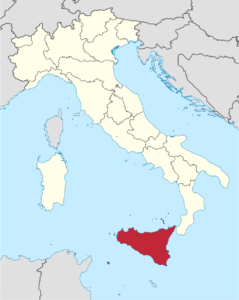Sicily

Location
Sicily, the southernmost region of Italy, is an island with a diverse landscape.
It lies further south than Tunis in Africa.
Grape Variety:
Catarratto: A white grape variety.
Nero d’Avola: A red grape variety known for its bold character.
Climate:
he island’s climate varies from coastal Mediterranean to hot and dry inland areas.
Vineyards sit as high as 3,900 feet (1,200 meters) above sea level, allowing for diverse terroirs.
Mount Etna, Europe’s most active volcano, influences the climate and soil composition in the northeast, where volcanic soils contribute to elegant red and white wines1
History:
Sicily has a rich winemaking heritage dating back over 2,500 years.
Historically, it was famous for sweet muscat wines like Zibibbo.
Today, Sicily produces a wide range of dry table wines.
Famous Wines:
Sicily offers a mosaic of flavors, grapes, and styles under the Sicilia DOC designation.
Nero d’Avola and Grillo are popular varieties.
Sparkling wines, rosé, and dessert wines are also produced.
Notably, the volcanic soils of Mount Etna yield elegant reds and whites made from Nerello Mascalese and Carricante grapes12.